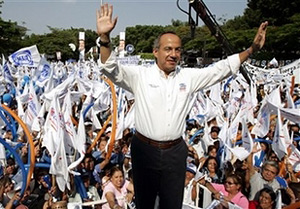 |
 |
 |
 News Around the Republic of Mexico | June 2006 News Around the Republic of Mexico | June 2006  
Mexico Political Groups Demand to be Heard
 Lisa J. Adams - Associated Press Lisa J. Adams - Associated Press


| | Mexican presidential candidate Felipe Calderon, of the National Action Party (PAN), waves to the crowd during a rally in Cuernavaca, Mexico, Tuesday, June 27, 2006. Mexican elections will take place July 2. (AP/Gregory Bull) |
For decades, political activism in Mexico often meant showing up at rallies, voting for the ruling party and picking up a bag of fertilizer, a basket of food or even cash.

But that began changing in the late 1980s as nonpartisan reformers worked for stronger electoral laws and sent tens of thousands of poll watchers to keep an eye on the ballot boxes.

Their efforts helped end the Institutional Revolutionary Party's grip on power in 2000 with the election of President Vicente Fox.

Now citizens' groups are scrutinizing the candidates ahead of Sunday's vote in the most wide-open presidential race in Mexican history.

Felipe Calderon of Fox's conservative National Action Party is in a tight battle against Andres Manuel Lopez Obrador of the leftist Democratic Revolution Party. The Institutional Revolutionary Party candidate Roberto Madrazo is running a distant third; two other candidates trail far behind.

Nonpartisan citizens' groups are an important development in a country where, a little more than a decade ago, millions allowed a political party to dictate how they voted and where elections served largely as ceremonies to ratify the president's choice of a successor.

"The Citizens' Magnifying Glass," a Web site founded by historian Enrique Krauze, keeps a record of the main candidates' speeches, public comments, and a ranking by experts of the feasibility of the candidates' proposals.

"Society on the Move," a collaboration of 1,300 groups, has launched an effort to get out the vote and presented the five presidential candidates with a list of 20 questions on issues such as crime, the economy, corruption and education. All but one of the five responded.

After the election, the group — which represents everyone from businessmen and college professors to farmers and housewives — plans to consult with other organizations on pressing issues and then suggest plans of action to elected officials.

I Matter, a three-year-old Web-based organization promoting a "participative democracy," offers analyses of the key issues, information and critiques about the candidates and space for public discourse.

"Full democracy implies participation," said Fernando Sanchez, one of the group's founders. "Instead of a representative democracy we want it to be a participatory democracy."

Civic Alliance and Citizens' Presence, two Mexico-based non-governmental groups promoting political involvement since 1994, are again sending hundreds of observers to the polls. The organizations also advised voters about how to watch for fraud throughout the campaign.

In an initiative called "Tu Rock es Votar," modeled on MTV's "Rock the Vote" campaign, Mexican pop stars are giving free concerts to persuade 7 million more young people to register and vote.

The nonprofit Mexico United Against Crime persuaded candidates to sign a pact promising to reduce crime and improve the justice system. Business and entertainment leaders, including telecommunications magnate Carlos Slim, got the candidates to endorse a statement of goals for improving the country's economic and social prospects.

"The role that the non-governmental organizations have is each day more relevant for individual Mexicans and the country as a whole," public policy specialist Alberto Saracho wrote recently in the Mexican magazine "Letras Libres."

In an interview, however, Saracho noted that Mexico's civil society is still "in a learning process."

"There are still very few organizations compared to other countries," he said.

Many of the groups target the middle and upper classes, leaving out nearly half the population, which lives in poverty, noted Reynaldo Ortega, a political scientist at the College of Mexico.

Sanchez said only about 20 percent of the population is politically active. "Eighty percent are not doing anything," he said.

Citizens' Presence: http://www.presenciaciudadana.org.mx/english/english.htm | 
 | |
 |



